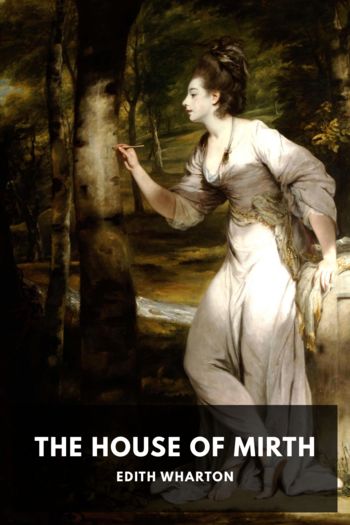The Age of Innocence - Edith Wharton (8 ebook reader .txt) 📗

- Author: Edith Wharton
Book online «The Age of Innocence - Edith Wharton (8 ebook reader .txt) 📗». Author Edith Wharton
Against the uniform sheet of snow and the greyish winter sky the Italian villa loomed up rather grimly; even in summer it kept its distance, and the boldest coleus bed had never ventured nearer than thirty feet from its awful front. Now, as Archer rang the bell, the long tinkle seemed to echo through a mausoleum; and the surprise of the butler who at length responded to the call was as great as though he had been summoned from his final sleep.
Happily Archer was of the family, and therefore, irregular though his arrival was, entitled to be informed that the Countess Olenska was out, having driven to afternoon service with Mrs. van der Luyden exactly three quarters of an hour earlier.
“Mr. van der Luyden,” the butler continued, “is in, sir; but my impression is that he is either finishing his nap or else reading yesterday’s Evening Post. I heard him say, sir, on his return from church this morning, that he intended to look through the Evening Post after luncheon; if you like, sir, I might go to the library door and listen—”
But Archer, thanking him, said that he would go and meet the ladies; and the butler, obviously relieved, closed the door on him majestically.
A groom took the cutter to the stables, and Archer struck through the park to the highroad. The village of Skuytercliff was only a mile and a half away, but he knew that Mrs. van der Luyden never walked, and that he must keep to the road to meet the carriage. Presently, however, coming down a footpath that crossed the highway, he caught sight of a slight figure in a red cloak, with a big dog running ahead. He hurried forward, and Madame Olenska stopped short with a smile of welcome.
“Ah, you’ve come!” she said, and drew her hand from her muff.
The red cloak made her look gay and vivid, like the Ellen Mingott of old days; and he laughed as he took her hand, and answered: “I came to see what you were running away from.”
Her face clouded over, but she answered: “Ah, well—you will see, presently.”
The answer puzzled him. “Why—do you mean that you’ve been overtaken?”
She shrugged her shoulders, with a little movement like Nastasia’s, and rejoined in a lighter tone: “Shall we walk on? I’m so cold after the sermon. And what does it matter, now you’re here to protect me?”
The blood rose to his temples and he caught a fold of her cloak. “Ellen—what is it? You must tell me.”
“Oh, presently—let’s run a race first: my feet are freezing to the ground,” she cried; and gathering up the cloak she fled away across the snow, the dog leaping about her with challenging barks. For a moment Archer stood watching, his gaze delighted by the flash of the red meteor against the snow; then he started after her, and they met, panting and laughing, at a wicket that led into the park.
She looked up at him and smiled. “I knew you’d come!”
“That shows you wanted me to,” he returned, with a disproportionate joy in their nonsense. The white glitter of the trees filled the air with its own mysterious brightness, and as they walked on over the snow the ground seemed to sing under their feet.
“Where did you come from?” Madame Olenska asked.
He told her, and added: “It was because I got your note.”
After a pause she said, with a just perceptible chill in her voice: “May asked you to take care of me.”
“I didn’t need any asking.”
“You mean—I’m so evidently helpless and defenceless? What a poor thing you must all think me! But women here seem not—seem never to feel the need: any more than the blessed in heaven.”
He lowered his voice to ask: “What sort of a need?”
“Ah, don’t ask me! I don’t speak your language,” she retorted petulantly.
The answer smote him like a blow, and he stood still in the path, looking down at her.
“What did I come for, if I don’t speak yours?”
“Oh, my friend—!” She laid her hand lightly on his arm, and he pleaded earnestly: “Ellen—why won’t you tell me what’s happened?”
She shrugged again. “Does anything ever happen in heaven?”
He was silent, and they walked on a few yards without exchanging a word. Finally she said: “I will tell you—but where, where, where? One can’t be alone for a minute in that great seminary of a house, with all the doors wide open, and always a servant bringing tea, or a log for the fire, or the newspaper! Is there nowhere in an American house where one may be by one’s self? You’re so shy, and yet you’re so public. I always feel as if I were in the convent again—or on the stage, before a dreadfully polite audience that never applauds.”
“Ah, you don’t like us!” Archer exclaimed.
They were walking past the house of the old Patroon, with its squat walls and small square windows compactly grouped about a central chimney. The shutters stood wide, and through one of the newly-washed windows Archer caught the light of a fire.
“Why—the house is open!”





Comments (0)